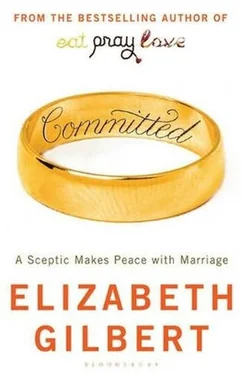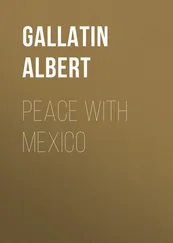Truth be told, it seemed mostly irritating to people-even to people who loved us-that Felipe and I were walking around wearing wedding rings without having had an official and legal marriage ceremony. The consensus was that our actions were confusing at best, pathetic at worst. “No!” declared my old friend Brian in an e-mail from North Carolina when I told him that Felipe and I had recently exchanged private vows. “No, you cannot just do it that way!” he insisted. “That’s not enough! You must have some kind of real wedding!”
Brian and I argued over this subject for weeks, and I was surprised to discover his adamancy on the topic. I thought that he, of all people, would understand why Felipe and I shouldn’t need to marry publicly or legally just to satisfy other people’s conventions. Brian is one of the happiest married men I know (his devotion to Linda makes him the living definition of the marvelous word uxorious, or “wife-worshiping”), but he’s also quite possibly my most naturally nonconformist friend. He bends comfortably to no socially accepted norm whatsoever. He’s basically a pagan with a Ph.D. who lives in a cabin in the woods with a composting toilet; this was hardly Miss Manners. But Brian was uncompromising in his insistence that private vows spoken only before God do not count as marriage.
“MARRIAGE IS NOT PRAYER!” he insisted (italics and capitals his). “That’s why you have to do it in front of others, even in front of your aunt who smells like cat litter. It’s a paradox, but marriage actually reconciles a lot of paradoxes: freedom with commitment, strength with subordination, wisdom with utter nincompoopery, etc. And you’re missing the main point-it’s not just to ’satisfy’ other people. Rather, you have to hold your wedding guests to their end of the deal. They have to help you with your marriage; they have to support you or Felipe, if one of you falters.”
The only person who seemed more annoyed than Brian about our private commitment ceremony was my niece Mimi, age seven. First of all, Mimi felt prodigiously ripped off that I hadn’t thrown a real wedding, because she really wanted to be a flower girl at least once in her life and had never yet been given the chance. Meanwhile, her best friend and rival Moriya had already been a flower girl twice-and Mimi wasn’t getting any younger here, people.
Moreover, our actions in Tennessee offended my niece on an almost semantic level. It had been suggested to Mimi that she could now, after that exchange of private vows in Knoxville, refer to Felipe as her uncle-but she wasn’t having it. Nor did her older brother Nick buy it. It wasn’t that my sister’s kids didn’t like Felipe. It’s just that an uncle, as Nick (age ten) instructed me sternly, is either the brother of your father or mother, or he is the man who is legally married to your aunt. Felipe, therefore, was not officially Nick and Mimi’s uncle any more than he was officially my husband, and there was nothing I could do to convince them otherwise. Children at that age are nothing if not sticklers for convention. Hell, they’re practically census takers. To punish me for my civil disobedience, Mimi took to calling Felipe her “uncle” using the sarcastic air quotes every time. Sometimes she even referred to him as my “husband”-again with the air quotes and the hint of irritated disdain.
One night back in 2005, when Felipe and I were having dinner at Catherine’s house, I had asked Mimi what it would take for her to consider my commitment to Felipe a valid one. She was unyielding in her certainty. “You need to have a real wedding,” she said.
“But what makes something a real wedding?” I asked.
“You need to have a person there.” Now she was frankly exasperated. “You can’t just make promises with nobody seeing it. There has to be a person who watches when you make promises.”
Curiously enough, Mimi was making a strong intellectual and historical point there. As the philosopher David Hume explained, witnesses are necessary in all societies when it comes to important vows. The reason is that it’s not possible to tell whether a person is telling the truth or lying when he speaks a promise. The speaker may have, as Hume called it, “a secret direction of thought” hidden behind the noble and high-flown words. The presence of the witness, though, negates any concealed intentions. It doesn’t matter anymore whether you meant what you said; it matters merely that you said what you said, and that a third party witnessed you saying it. It is the witness, then, who becomes the living seal of the promise, notarizing the vow with real weight. Even in the early European Middle Ages, before the times of official church or government weddings, the expression of a vow before a single witness was all it took to seal a couple together forever in a state of legal matrimony. Even then, you couldn’t do it entirely on your own. Even then, somebody had to watch.
“Would it satisfy you,” I asked Mimi, “if Felipe and I promised wedding vows to each other, right here in your kitchen, in front of you?”
“Yeah, but who would be the person?” she asked.
“Why don’t you be the person?” I suggested. “That way you can be sure it’s done properly.”
This was a brilliant plan. Making sure that things are done properly is Mimi’s specialty. This is a girl who was veritably born to be the person. And I’m proud to report that she rose to the occasion. Right there in the kitchen, while her mother cooked dinner, Mimi asked Felipe and me if we would please rise and face her. She asked us to please hand her the gold “wedding” rings (again with the air quotes) that we had already been wearing for months. These rings she promised to hold safely until the ceremony was over.
Then she improvised a matrimonial ritual, cobbled together, I supposed, from various movies she had seen in her seven long years of life.
“Do you promise to love each other all the time?” she asked.
We promised.
“Do you promise to love each other through sick and not sick?”
We promised.
“Do you promise to love each other through mad and not mad?”
We promised.
“Do you promise to love each other through rich and not so rich?” (The idea of flat-out poor, apparently, was not something Mimi cared to wish upon us; thus “not so rich” would have to suffice.)
We promised.
We all stood there for a moment in silence. It was evident that Mimi would have liked to remain in the authoritative position of the person for a bit longer, but she couldn’t come up with anything else that needed promising. So she gave us back our rings and instructed us to place them on each other’s fingers.
“You may now kiss the bride,” she pronounced.
Felipe kissed me. Catherine gave a small cheer and went back to stirring the clam sauce. Thus concluded, right there in my sister’s kitchen, the second non-legally-binding commitment ceremony of Liz and Felipe. This time with an actual witness.
I hugged Mimi. “Satisfied?”
She nodded.
But plainly-you could read it all over her face-she was not.
What is it about a public, legal wedding ceremony that means so much to everybody anyhow? And why was I so stubbornly-almost belligerently-resistant to it? My aversion made even less sense, considering that I happen to be somebody who loves ritual and ceremony to an inordinate degree. Look, I’ve studied my Joseph Campbell, I’ve read The Golden Bough, and I get it. I thoroughly recognize that ceremony is essential to humans: It’s a circle that we draw around important events to separate the momentous from the ordinary. And ritual is a sort of magical safety harness that guides us from one stage of our lives into the next, making sure we don’t stumble or lose ourselves along the way. Ceremony and ritual march us carefully right through the center of our deepest fears about change, much the same way that a stable boy can lead a blindfolded horse right through the center of a fire, whispering, “Don’t overthink this, buddy, okay? Just put one hoof in front of the other and you’ll come out on the other side just fine.”
Читать дальше












